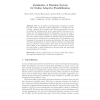Free Online Productivity Tools
i2Speak
i2Symbol
i2OCR
iTex2Img
iWeb2Print
iWeb2Shot
i2Type
iPdf2Split
iPdf2Merge
i2Bopomofo
i2Arabic
i2Style
i2Image
i2PDF
iLatex2Rtf
Sci2ools
148
Voted
CC
2012
Springer
2012
Springer
Sambamba: A Runtime System for Online Adaptive Parallelization
Abstract. How can we exploit a microprocessor as efficiently as possible? The “classic” approach is static optimization at compile-time, optimizing a program for all possible uses. Further optimization can only be achieved by anticipating the actual usage profile: If we know, for instance, that two computations will be independent, we can run them in parallel. In the Sambamba project, we replace anticipation by adaptation. Our runtime system provides the infrastructure for implementing runtime adaptive and speculative transformations. We demonstrate our framework in the context of adaptive parallelization. We show the fully automatic parallelization of a small irregular C program in combination with our adaptive runtime system. The result is a parallel execution which adapts to the availability of idle system resources. In our exam
Related Content
| Added | 20 Apr 2012 |
| Updated | 20 Apr 2012 |
| Type | Journal |
| Year | 2012 |
| Where | CC |
| Authors | Kevin Streit, Clemens Hammacher, Andreas Zeller, Sebastian Hack |
Comments (0)

